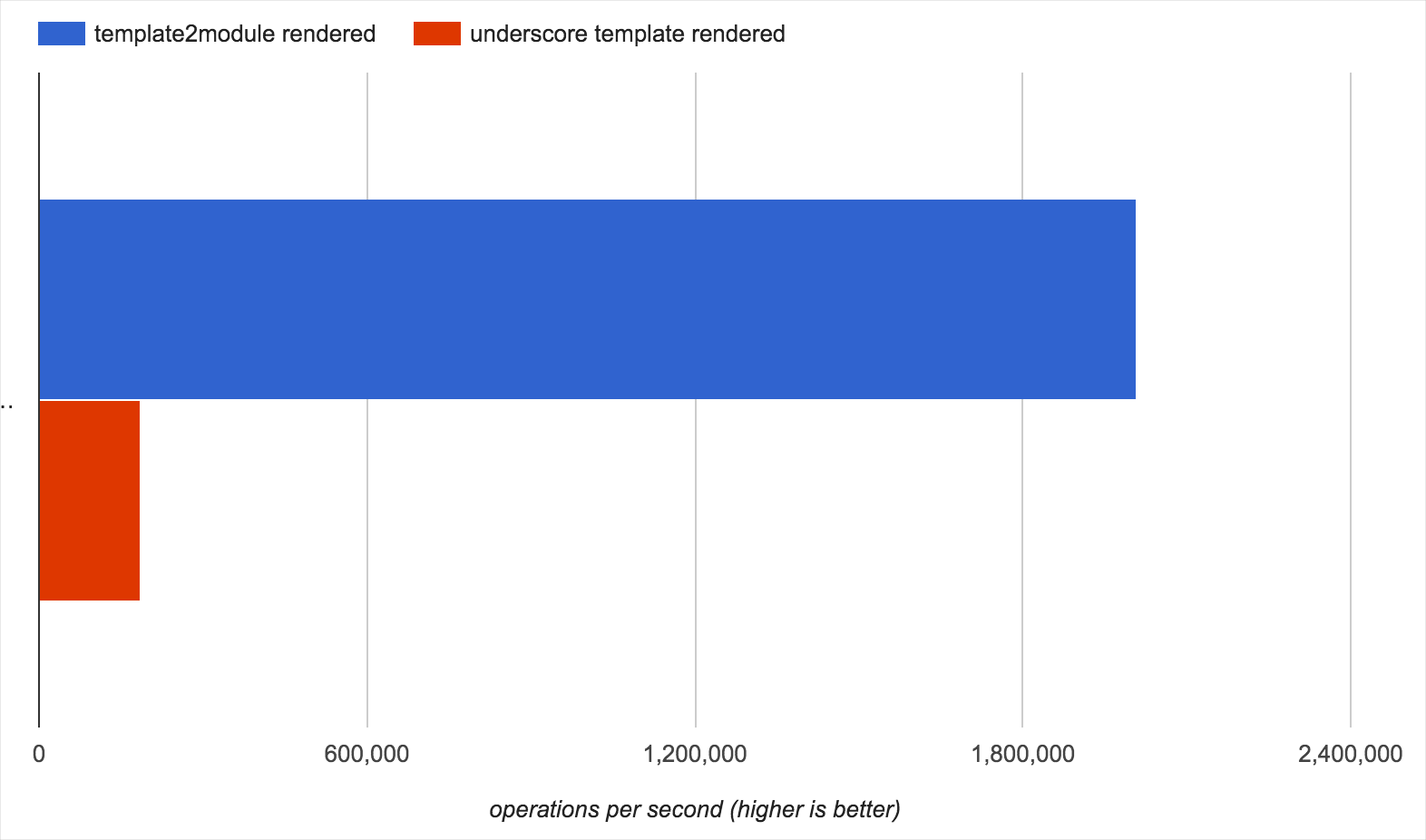0.2.3 • Published 9 years ago
template2module v0.2.3
template2module
precompile templates into modules, built for high performance
template2module vs underscore(jsperf)

install
# global
$ npm install template2module -g
# local
$ npm install template2module --save-devusage
command line interface
$ template2module \
--engine(-e) <[underscore/dot/micro/anima]> \
--format(-f) <[amd/commonjs/esnext/umd]> \
--config(-c) <$path/to/config/file.js(.json)> \
$path/to/source/fileapi interface
var tpl2mod = require('template2module');
// render a underscore template into a module
var underscoreEngine = tpl2mod.engines.underscore;
underscoreEngine.render(
templateStr, /* template string */
moduleName, /* name of the target module */
moduleFormat, /* can be one of [amd|commonjs|esnext|umd] or a template render function */
filePath, /* engines that support `include` functionality might need it */
config /* configuration for the engine */
);customize
in case you need to render your template into a module that is in commonjs format, and it has got some extra dependencies(zero-lang, zero-text, etc.), and you do not want to pass the helper object as one of the arguments every time you use the module.
var tpl2mod = require('template2module');
var templateEngine = require('your-template-engine');
var Engine = tpl2mod.Engine;
var myAwesomeEngine = new Engine({
outerScopeVars: {
_e: true,
_p: true,
_s: true,
helper: true,
translate: true
},
outerScopeWrapper: function(data) {
return [
'function (data, helper) {',
' data = data || {};',
' helper = helper || lang;',
' var _p = helper.print || function (s) {',
' return (s === null || s === undefined) ? '' : s;',
' };',
' var _e = helper.escape || _p;',
' return (function (' + data.formalArguments + ') {',
data.functionBody,
' })(' + data.realArguments + ');',
'}'
].join('\n');
},
parse: function (str) {
return {
functionBody: sprintf(
"var _s = '%s'; return _s;",
templateEngine.parse(str)
)
};
},
render: function(str, moduleName) {
// target moduleFormat is 'commonjs' only
var resultStr = Engine.prototype.render.call(this, str, moduleName, 'commonjs');
// add extra dependencies in the rendered function
return [
'var lang = require("zero-lang");',
'var i18n = require("zero-locale");',
'var translate = i18n.translate;',
''
].join('\n') + resultStr;
}
});
myAwesomeEngine.render(templateStr, moduleName);If you are using one of the supported engines, it would be much easier:
var tpl2mod = require('template2module');
var underscoreEngine = tpl2mod.engines.underscore;
var Engine = tpl2mod.Engine;
underscoreEngine.outerScopeVars.translate = true; // your extra helper function
underscoreEngine.render = function(str, moduleName) {
// target moduleFormat is 'commonjs' only
var resultStr = Engine.prototype.render.call(this, str, moduleName, 'commonjs');
// add extra dependencies in the rendered function
return [
'var lang = require("zero-lang");',
'var i18n = require("zero-locale");',
'var translate = i18n.translate;',
''
].join('\n') + resultStr;
};
underscoreEngine.render(templateStr, moduleName);design
module structure
// wrapping in amd/commonjs/esnext/umd format
function outerFunction(data, helper) {
// initializing
return (function innerFunction(arg1, arg2, .../* formal arguments */) {
// inner function body
})(data.arg1, data.arg2, .../* real arguments */);
}transform flow

supported template engines
- anima: animajs/template
- dot: doT.js
- micro: Microtemplating
- nano: trix/nano
- underscore: Underscore templates
and defining your own engine is SUPER EASY
supported modular formats
what's next
- use a move powerful AST analyzer (substack/node-falafel, etc.), to support more engines
- support more engines(pug, nunjucks, handlebar, jsrender, mustache, etc.)
- optimize module after rendered (google/closure-compiler, etc.)
- a friendly API interface
- toolkits: gulp task, webpack loader, grunt task, etc.
0.2.3
9 years ago
0.2.2
9 years ago
0.2.1
9 years ago
0.2.0
9 years ago
0.1.0
10 years ago
0.0.20160409
10 years ago
0.0.20160408
10 years ago
0.0.20160407
10 years ago
0.0.20160406
10 years ago